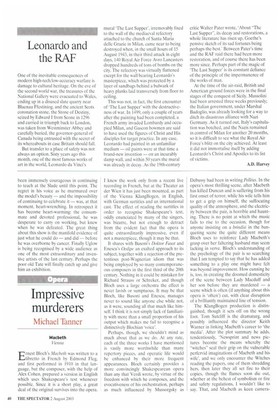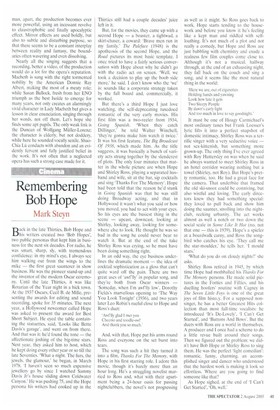Impressive murderers
Michael Tanner
Macbeth henna
Ernest Bloch's Macbeth was written to a libretto in French by Edmond Fleg, and first performed in 1910 in that language, but the composer, with the help of Alex Cohen, prepared a version in English which uses Shakespeare's text whenever possible. Since it is a short play, a great deal of the original survives into the opera.
I knew the work only from a recent live recording in French, but at the Theater an der Wien it has just been mounted, as part of the Vienna KlangBogen, in English, with German surtitles and an international cast. The effect of reading the surtitles in order to recognise Shakespeare's text, oddly enunciated by many of the singers, was bizarre, but not enough to detract from the evident fact that the opera is quite extraordinarily impressive, even if not a masterpiece, though it may be that.
It shares with Busoni's Doktor Faust and Enescu's Oedipe an exalted approach to its subject, together with a rejection of the pretentious post-Wagnerian idiom that was being employed by so many contemporaneous composers in the first third of the 20th century. Nothing in it could be mistaken for Richard Strauss or Schreker, and though Bloch uses a large orchestra the effect is never lavish or sumptuous. It may be that Bloch, like Busoni and Enescu, manages never to sound like anyone else while not, as it were, sounding all that much like himself. I think it is not simply lack of familiarity with more than a small proportion of his output which makes me fail to recognise a distinctively Blochian 'voice'.
Perhaps, though, we shouldn't mind as much about that as we do. At any rate, each of the three works I have mentioned is vastly more worthwhile than many repertory pieces, and operatic life would be enhanced by their more frequent appearances. Bloch certainly provides a more convincingly Shakespearean opera than any that Verdi wrote, by virtue of the freedom with which he composes, and the evocativeness of his orchestration. perhaps as much influenced by Mussorgsky as Debussy had been in writing Pelleas. In the opera's most thrilling scene, after Macbeth has killed Duncan and is suffering from his first onset of terror, while his wife tells him to get a grip on himself, the suffocating quality of the atmosphere, and the electricity between the pair, is horrible and haunting. There is no point at which the music fails to rise to the occasion, though for anyone insisting on a brindisi in the banqueting scene the quite different means Bloch uses to reinforce Lady Macbeth's grasp over her faltering husband may seem lacking in verve. Bloch's understanding of the psychology of the pair is so searching that I am tempted to say that he has added something to a play one might have felt was beyond improvement. How cunning he is, too. in creating the doomed domesticity of the scene between Lady Maccluff and her son before they are murdered — a scene which is often (if anything about this opera is 'often') cut, with clear disruption of a brilliantly maintained line of tension.
The KlangBogen production is distinguished, though it sets off on the wrong foot. Tom Sutcliff is the drarriaturg, and possibly influenced the director Keith Warner in linking Macbeth's career to 'the media'. After the plot summary he adds. tendentiously, 'Newsprint and news pictures become the means whereby the "witches" seal their grip on the vulnerable perfervid imaginations of Macbeth and his wife', and we only encounter the Witches reading the papers, one of them shredding hers, then later they all set fire to their copies, though the flames soon die out, whether at the behest of symbolism or fire and safety regulations, I wouldn't like to say. That, and Macbeth as keen camera man, apart, the production becomes ever more powerful, using an incessant revolve to claustrophobic and finally apocalyptic effect. Mirror effects are used boldly, but also to subtle and disturbing purpose, so that there seems to be a constant interplay between reality and fantasy, the boundaries often wavering and even dissolving.
Nearly all the singing suggests that a recording, better a video, of the production would do a lot for the opera's reputation. Macbeth is sung with the right tormented nobility by the American Donnie Ray Albert, making the most of a meaty role; while Susan Bullock, fresh from her ENO triumph as the best IsoIde to emerge for many years, not only creates an alarmingly vivid character in Lady Macbeth but gives a lesson in clear enunciation, singing through her words, not off them. Let's hope she finds some apt pupils. The only weak link is the Duncan of Wolfgang MilIler-Lorenz; the character is elderly, but not doddery, while here he sounded vocally senile. ShaoChia Lii conducts with abandon and an evidently fervent and fully justified belief in the work. It's not often that a neglected opera has such a strong case made for it.



























































 Previous page
Previous page